When is the best time to do influvac? Influvac ® (inactivated subunit influenza vaccine) (Influvac ®)
Influvac- influenza subunit inactivated vaccine for the prevention of influenza in adults and children from 6 months of age. Develops specific immunity to influenza viruses type A and B, provides protection against influenza. It has high immunogenicity and low reactogenicity. Vaccination can be given to anyone who wants to reduce the risk of influenza and avoid possible complications flu.
Latin name:
INFLUVAC / INFLUVAC.
Composition and form of release:
Influvac suspension for injection (for intramuscular and subcutaneous administration) in disposable syringes "Dufarject" 0.5 ml, 1 or 10 pcs. in a package, complete with injection needles.
1 dose (0.5 ml) of Influvac vaccine contains: hemagglutinin (15 mcg of HA) and neuraminidase of three influenza viruses. The antigenic composition of the influenza vaccine Influvac is updated annually according to the recommendations World Organization health care; each year the virus strains for the new season are indicated.
Properties / Action:
Influvac is a subunit trivalent inactivated influenza vaccine of the 3rd generation.
Influvac contains purified surface antigens of influenza A and B viruses - hemagglutinin (HA) and neuraminidase (NA), which are obtained from certain influenza virus vaccine strains grown in chicken embryos. The antigenic composition of the influenza vaccine Influvac is updated annually in accordance with the recommendations of the World Health Organization (WHO).
Influvac vaccine develops specific immunity to influenza A and B viruses and provides protection against influenza. Purified antigens (hemagglutinin and neuraminidase) contained in the Influvac vaccine cause an increase in antibody titer, which is necessary for protective effect, which occurs, as a rule, 14 days after the injection. The duration of post-vaccination immunity lasts up to 12 months. Degree of protection in the elderly and children younger age lower than in adults.
High immunogenicity and very low reactogenicity, due to the high-tech production of the Influvac vaccine, makes it possible to prevent influenza in adults and children from 6 months of age.
Pharmacokinetics:
Influvac - immunobiological drug; pharmacokinetic studies have not been conducted.
Indications:
Influvac is indicated for the prevention of influenza in adults and children from 6 months of age.
Vaccination can be carried out by all persons who wish to reduce the risk of influenza and avoid its possible complications.
Vital importance Influvac has for patients included in risk groups:
- patients with respiratory diseases;
- patients with cardiovascular diseases of any etiology;
- patients with chronic renal failure;
- patients with diabetes;
- patients with staphylococcal infections;
- patients with immunodeficiencies (HIV infection, malignant blood diseases, etc.);
- patients receiving immunosuppressants, cytostatics, high doses of corticosteroids, radiation therapy;
- persons over 65 years of age, regardless of their state of health;
- children and adolescents (6 months to 18 years of age) receiving long-term medications containing acetylsalicylic acid, and therefore subject to increased risk development of Reye's syndrome (Reye) due to influenza infection;
- pregnant women in the 2nd and 3rd trimesters of pregnancy.
Dosage and administration:
Immunization is carried out annually autumn period. Influvac is administered intramuscularly or deep subcutaneously. It is strictly forbidden to administer the drug intravenously.
Influvac dose for adults and adolescents over 14 years of age: 0.5 ml once.
Dose of Influvac for children from 6 months of age to 3 years: 0.25 ml once.
Dose of Influvac for children from 3 to 14 years old: 0.5 ml once.
For children who have not previously had influenza and have not previously been vaccinated, it is recommended to administer two doses of Influvac with an interval of 4 weeks.
Patients with immunodeficiency are recommended to administer two doses of Influvac with an interval of 4 weeks.
Dufarject.
The design of the Dufarject syringe is based on a unique original device. The syringe is easy to handle and provides a completely safe and painless injection of the exact dose of Influvac vaccine.
Instructions for handling disposable syringes.
Before administration, the vaccine must be heated to room temperature. Shake the syringe immediately before injection. Remove the protective cap from the needle and remove air from the syringe by holding it in a vertical position with the needle up and slowly pressing the plunger. When a dose of 0.25 ml is administered, the movement of the syringe plunger is stopped at the moment when it inner surface reaches the lower edge of the needle holder.
Overdose:
There are no data on overdose of Influvac vaccine.
Contraindications:
- individual intolerance (including history of hypersensitivity) to chicken protein or other components of Influvac;
- severe temperature or severe allergic reactions after a previous vaccination with subunit influenza vaccines;
- acute illnesses and exacerbations chronic diseases(vaccination is delayed until the end of acute manifestations).
For non-severe acute respiratory viral infections, acute intestinal and other diseases, vaccination with Influvac is carried out immediately after normalization of body temperature.
Use during pregnancy and lactation:
Before vaccination during pregnancy, the risk of possible side effects with the risk of getting the flu and the risk of developing complications of the flu. Experience has shown that Influvac can be used without any fetal concern during pregnancy; influvac does not have a teratogenic or toxic effect on the fetus in pregnant women.
Influvac can be used during lactation (breastfeeding).
Side effect:
Safety of the Influvac vaccine:
Since the Solvay company started manufacturing Influvac, only a few cases of side effects have been reported, which were registered during the studies. The fact that more than 23 million doses of Influvac vaccine have been administered over a five-year follow-up period and no known side effects have been observed that could be related to its action is an additional guarantee of the safety of the vaccine.
Inherent in the Influvac vaccine is the ratio between possible risk and the expected beneficial effect is highly appreciated in the context of the prevention of influenza and its complications.
Possible side effects of Influvac vaccine:
You may experience local side effects such as redness, swelling and soreness at the injection site. In very rare cases, there may be an increase in regional lymph nodes.
Rarely, systemic side effects occur: feeling tired, headache, sweating, fever, soreness in muscles and joints. These symptoms go away on their own in 1-2 days.
In very rare cases, neuralgia, parasthesia, convulsions, short-term thrombocytopenia may occur.
In even rarer cases, it is possible to develop neurological disorders, vasculitis with temporary impairment of kidney function.
In extremely rare cases, allergic reactions are accompanied by the development of shock.
Special instructions and precautions:
IT IS STRICTLY FORBIDDEN TO INTRODUCE THE DRUG INTRAVENOUSLY!
Vaccination with Influvac is recommended primarily for patients with respiratory diseases, cardiovascular diseases, chronic renal failure, diabetes mellitus, staphylococcal infections, immunodeficiency diseases; patients receiving immunosuppressants, cytostatics, radiation therapy or corticosteroids in high doses. Vaccination is especially recommended for children and adolescents aged 6 months to 18 years who have been receiving drugs containing acetylsalicylic acid for a long time and, therefore, are at increased risk of developing Reye's syndrome due to influenza infection.
Vaccination with Influvac is postponed until the end of acute manifestations of the disease and exacerbation of chronic diseases. For non-severe SARS, acute intestinal diseases vaccination is carried out immediately after normalization of temperature.
Patients with a history of side effects on the introduction of various vaccines, if necessary, simultaneous vaccination with Influvac and other vaccines, the drugs should be administered at least 3 weeks apart.
In the room where vaccination is carried out, it is necessary to have medicines for the treatment of anaphylactic shock.
After vaccination, it is possible to receive false positives serological tests in enzyme immunoassay (ELISA), which are due to the production of IgM after vaccination.
INinfluence on the ability to drive a car and control machines and mechanisms:
Influvac does not affect the ability to drive a car and use machines and mechanisms.
drug interaction:
Cases of incompatibility of the drug Influvac with other drugs are unknown.
Influvac can be used simultaneously with other vaccines. In this case, the vaccines should be administered into different limbs, with different syringes, keeping in mind the theoretical possibility of increasing side effects. In patients with already known reactions of this kind, separate administration of drugs with an interval of at least 3 weeks is recommended.
If the patient is receiving immunosuppressive therapy, the immune response may be reduced.
Storage conditions:
Store in a place protected from light, at a temperature of 2°C to 8°C (in the refrigerator). Do not freeze!
Keep out of the reach of children!
Influvac retains its properties for 12 months. At the same time, the expiration date is June 30 of the year following the year of manufacture (to avoid confusion with vaccines of the old and new composition).
Do not use after the expiration date stated on the packaging.
Conditions for dispensing from a pharmacy - according to a doctor's prescription.
Are you afraid of getting the flu? Then you should consider getting vaccinated. Thanks to this event, a person will maintain his health, not get sick with the flu or get sick, but in a mild form. Immunization is the right thing to do, especially when it comes to our kids. Therefore, today we will consider what the Influvac flu vaccine is, as well as Vaxigripp. These are common drugs used in Russia and Ukraine. They can prevent influenza infection. Below we consider the composition of both vaccines, their dosages. We also determine which of them will be better than the other.
Composition, form of release of the vaccine "Influvac"
This drug is sold as a suspension, which is administered subcutaneously or intramuscularly. The vaccine "Influvac" is sold in syringes, which should be disposed of after the injection. Needles are also included with the preparation.
The composition of this vaccine is as follows:
Hemagglutinin and neuraminidase of viral strains of types: A (H3N2), A (H1N1), B.
Auxiliary elements: sodium phosphate dihydrate, potassium, calcium and magnesium chloride, hydrogen phosphate, water for injection.
Dosage of the vaccine "Influvac"
Adults, as well as children from 3 to 14 years old - 0.5 ml once.
Babies from 6 months to 3 years - 0.25 ml once.
For children who have never been vaccinated before, it is advisable to administer the drug twice with an interval of 4 weeks.
Immunization should be carried out once a year in the fall. 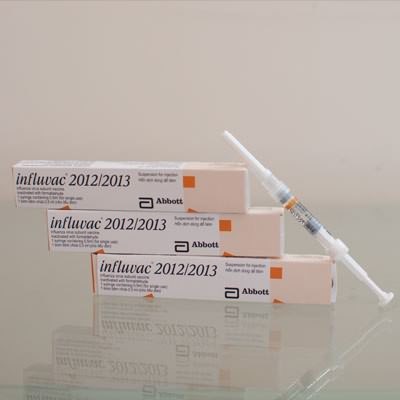
Side effects after vaccination with Influvac
The use of this remedy may cause the following unwanted reactions:
From the side of the central nervous system: often - headache; rarely - neuritis, convulsions, neuralgia, encephalomyelitis, paresthesia.
From the side of the heart and blood vessels: rarely - vasculitis (immunopathological inflammation of the vessels).
From the musculoskeletal system: often - arthralgia (joint pain), myalgia (pain in the muscle area).
General disorders: often - fatigue, fever, muscle and joint pain, malaise, trembling, chills.
Other manifestations: often - heavy sweating; rarely - skin manifestations (itching, urticaria, nonspecific rash).
Local reactions: swelling, induration, soreness, redness.
Composition, form of release of the vaccine "Vaxigripp"
This drug is also a suspension for injection under the skin or intramuscularly.
The Vaxigripp vaccine is available in syringes or ampoules.
The composition of the drug is as follows:
The active elements are hemagglutinin and neuraminidase of such virus strains as A (H3N2), A (H1N1), B.
Auxiliary components - sodium, as well as potassium chloride and dihydrophosphate, hydrophosphate dihydrate, water for injection. 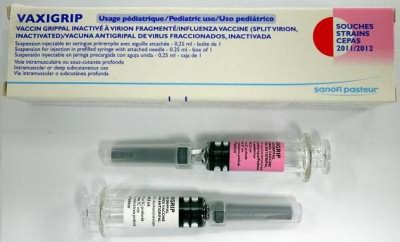
Rules for immunization and dosage of the drug "Vaxigripp"
This flu vaccine can be given:
Subcutaneously in upper part front side shoulder.
Intramuscularly in the deltoid muscle.
For small children - in the anterolateral region of the thigh.
The dosage of the drug is as follows:
Adults and children from 3 years old - 0.5 ml once.
Babies from six months to 3 years - 0.25 ml of the drug.
People who have not been vaccinated before, as well as those who have not had the flu at all, should be given this vaccine 2 times at an interval of 4 weeks. That is, one dose should be divided equally.
Patients with immunodeficiency should also be given the drug twice - 0.25 ml with an interval of 1 month. 
Side effects after vaccination with the drug "Vaxigripp"
This remedy also has negative effects. How to understand which vaccine - "Vaxigripp" or "Influvac" - is better? To do this, you can see a list of side effects of each drug. So, for the "Vaxigripp" tool, it is like this:
Often - headache, malaise, sweating, fatigue, muscle and joint pain, neuralgia.
Rarely - convulsions, paresthesia, neuritis, encephalomyelitis.
Very rarely - allergic manifestations on the body, vasculitis.
Local reactions - compaction, soreness, swelling at the injection site.
The cost of vaccines
The drug "Vaxigripp", the price of which varies in different pharmacies, can be purchased on average for 400 rubles. A person will have to pay such an amount for 1 dose of this remedy. I wonder how much then the drug "Influvac" costs? The price of this drug ranges from 520-570 rubles.
So what to choose?
To date, both vaccines are considered the most common flu vaccines for children and adults. Both drugs give the same result. However, parents do not stop terrorizing pharmacists and family doctors so that they advise which of the two vaccines - "Vaxigripp" or "Influvac" - will be better. The fact is that both drugs are almost indistinguishable from each other. Indications for use, form of release and even their composition is similar. But here in such a point as side effects, there is a difference. So, the means "Influvak" has much larger list possible negative manifestations, while in the case of the drug "Vaxigripp" this list is much shorter. If we consider the cost of these vaccines, then there is also something to cling to. The drug "Influvac" is somewhat more expensive than its competitor. Therefore, if you choose from these two criteria, then you should make a choice in favor of the Vaxigripp tool. The price is lower, and there are fewer side effects. But it's still better to find out what people think about these two vaccines, and based on their responses, decide for yourself what to choose. ![]()
The drug "Influvac": reviews
Internet users write mostly only positive opinions about this tool. So, those patients who were vaccinated with this drug note that the injection itself is painless, because the needle in the syringe is very thin. It is also rare that anyone notes that after vaccination with this remedy, problems arose. People, on the contrary, praise the Influvac drug for the fact that it almost never causes adverse reactions in organism. Also, women and men choose this particular vaccine, because it is imported, which means that it is better purified than domestic. In addition, the composition of the drug is improved every year, because new strains of influenza appear, so the developed immunity may not work. 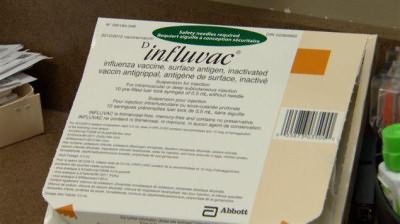
There are, however, negative responses from people. The first thing parents pay attention to is that Influvac is sold in a standard dosage. That is, it turns out that syringes are the same for both adults and children. This is very inconvenient, because if you make a vaccine for children, then the excess amount of the drug must be drained. It turns out that it is inefficiently spent. There are also people who note that after vaccination with Influvac, their health has deteriorated greatly. To prevent this from happening, it is necessary to inject only when the person is completely healthy. That is, no colds he shouldn't have. And if a person listens to the doctor and follows all his recommendations regarding vaccination, then the Influvac drug will receive only positive reviews. As for the cost of this tool, people note that its price is quite adequate, and it suits many.
The drug "Vaxigripp": reviews
This vaccine has positive feedback from patients. Some get an injection with this drug for free, others buy it for own funds. However, both those and others note the effectiveness of this vaccine: during the year, people do not get the flu. True, there are exceptions when a person nevertheless catches this virus, but the disease proceeds much easier. Also, people note that although the drug "Vaxigripp" is not the best of the existing ones, it is affordable. And this is an important factor. After all, it is often necessary to vaccinate all family members, and this can hit hard on family budget. That's why people choose more cheap remedy- "Vaxigrip". Positive reviews are also written by parents who are satisfied that the drug is sold separately for children, that is, in special 0.25 mg syringes. And no need to pour out excess liquid, because the dosage is accurate. 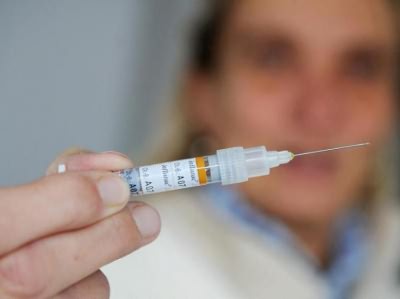
Expert opinion
And what do immunologists and pediatricians say about these vaccines? Which is better: Vaxigripp or Influvac? Doctors in this regard are unanimous. They believe that these drugs are approximately the same in their properties and effect. They do not single out any of them specifically. And the fact that the supposedly Influvac remedy is purer, this, according to doctors, is an insignificant sign that does not affect the production of immunity, as well as its perception by the body. Therefore, if at work they offer to carry out free vaccination, for example, with Vaxigripp, then it is advisable to agree. Since it is stupid to look for the Influvac drug in pharmacies, because these vaccines will be the same in terms of effectiveness. Well, if you do not have such an advantage, then indeed, you can purchase any of these two funds yourself. The main thing is to pay attention to the expiration date of the drug, as well as follow all recommendations for proper storage and transportation.
Now you know which of the two means - "Vaxigripp" or "Influvac" - is better. And they realized that in fact there is no difference in them. The nuance is that the first remedy can be sold in a special small dosage (for children). While part of the drug "Influvac" will have to be poured out, since the children need to inject only 0.25 mg, and 0.5 mg is in the syringe. Also, another point is that the Vaxigripp suspension is a little cheaper. Well, doctors do not allocate these funds, believing that they are approximately the same in terms of effectiveness.
A friend on Friday got a flu shot "vaxigripp" now lies with a runny nose and sore throat. is this normal??
Answers:
Vadim Kolosov
It means there is no immunity at all, vaccination is a weak disease. Instead of vaccination, you need to temper yourself and not smoke, of course, otherwise nothing will help.
Regina
Yes it is quite normal reaction. You need to take the antihistamine Diazolin, Loratodin and an immunostimulant, for example Aflubin, and everything will pass and be fine!
Mila
Yes, it can be. Or, it is such a reaction to the vaccine. And the reaction can be like this. This is fine. And yet, since the vaccine does not begin to act immediately, the girl (just coincidentally) just got sick.
Mila
Apparently, at that moment she was already unwell, and this is the effect that turned out, or it may be that she was recently ill and did not recover, but in general, when the vaccine is given, infection occurs, but in a small dose so that antibodies can be developed, therefore it digests it body vaccinated is normal
"Sovigripp" (vaccine): reviews of doctors and patients. Description, instructions, contraindications
Well, today we will try to figure out what "Sovigripp" (vaccine) reviews earn from doctors and patients. This drug is essential for modern man. After all, it is he who helps to fight with viral infections, whose epidemics are so common. True, before injecting, you really need to find out what doctors and patients think about this. Maybe it's better to use the old vaccines altogether? Or pay attention to the new one? Let's look into this issue. 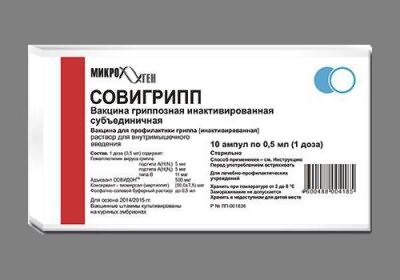
Description
Let's start with the fact that "Sovigripp" (vaccine) receives reviews from the moment of its description. That is, as soon as patients find out what it is, they write their opinions about the medication. This is not entirely correct. But the fact remains.
The thing is that Sovigripp is a kind of new Russian flu vaccine. Some concentrated solution in ampoules that contains killed and weakened influenza bacteria different type. To be honest, there is nothing special about it. Only now "Sovigripp" (vaccine) does not receive consumer reviews better character already because it is domestic. The modern population is skeptical about Russian vaccines. Especially for new ones. Just such is our today's preparation.
Indications
Of course, it is impossible to do without special indications for use. And this Sovigripp flu vaccine, reviews of which will be presented to our attention a little later, has a number of both recommendations and contraindications. They need to pay close attention. After all, injections of the virus and vaccinations are no joke.
"Sovigripp" is a vaccine that is recommended for administration to the entire adult population who wants to increase their immunity and protect themselves from various types of influenza. Approved for use by people over the age of 18. As the manufacturers assure, even during pregnancy and lactation (the most vulnerable categories of citizens, by the way), you can be vaccinated with the drug. Highly recommended "Sovigripp" (vaccine), reviews of which are left ambiguous, for those who have reduced immunity, and there is also a risk of serious complications after the disease. Sometimes this remedy also applies to routine vaccinations from influenza in schools. But it applies exclusively to the senior link of schoolchildren (grades 8-11). 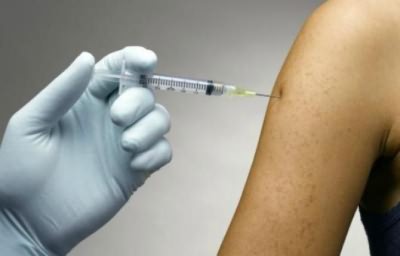
Contraindications
Contraindications should also not be forgotten. It is not enough to want to protect yourself from viral diseases and flu. You also need to have an idea of when injections are not allowed. Otherwise, you can simply harm own health. "Sovigripp" (vaccine), instructions, reviews and effectiveness of which are presented to our attention, this is not just some kind of injection. A really serious injection. And for this reason, contraindications should not be overlooked.
The flu vaccine "Sovigripp", reviews of which are of interest to many patients, is not recommended for use by people with hypersensitivity, as well as those who generally have intolerance to any vaccinations. Such cases are rare, but they do occur. Also for viral infections elevated temperature and any ailment on "Sovigripp" is banned. Young children and elementary school students should also not be given this injection. If you are prone to allergic reactions (including protein), you can also forget about the domestic method of protection against SARS and influenza. 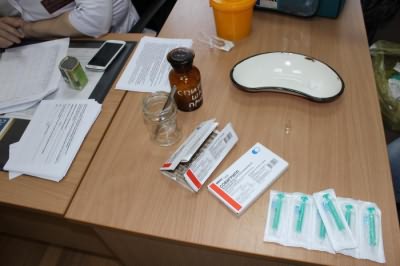
The restrictions don't end there. Strong post-vaccination reactions of the body and chronic diseases in the patient are also a reason for refusing to vaccinate with the drug. Thus, we can conclude that the drug has more than enough contraindications. You should not be afraid - similar restrictions are imposed on most vaccines. After all, a person should receive a weakened or killed virus when the body is in excellent condition. Otherwise, there is a risk not of developing immunity, but of disease.
Doctors' opinion
An important point is what doctors think about the domestic vaccine. After all, it is not in vain that before any vaccination it is advisable to consult a specialist. The vaccine "Sovigripp" reviews of doctors earns, oddly enough, very good.
Many claim that this tool Russian production helps fight the flu and its viruses faster than others. In addition, doctors say that the risk of complications in this case is reduced to almost zero. Allegedly, almost all patients tolerate the injection calmly and without consequences. 
Plus, sometimes this drug assigned to children. So, there is every reason to trust the vaccine. A pediatrician will never prescribe a drug that can harm a child. Yes, doctors also emphasize that for maximum effect I have to carry out injections with "Sovigripp" annually. But this is a mandatory measure, and it applies to all flu shots. So there is nothing to be afraid of.
Patients say
But the opinion of patients does not always coincide with the words of doctors. The population is already arranged in such a way that domestic medicine in Lately there is not much trust. And so "Sovigripp" (vaccine) patient reviews earn far from the best.
For example, the main reason for this is the manufacturer. He is Russian. And this fact already makes people doubt the effectiveness and safety of vaccination. It's no secret that in Russia, despite the development of the country, testing is not particularly effective. medical preparations. And so the risk of complications after injections remains high. But all this is carefully hidden. After all, the main task of doctors is to promote domestic medicine.
In addition, patients do repeatedly emphasize that after the vaccine they have a sharp deterioration in general state health for a few days. All this is attributed to side effect drug. But these cases are extremely common. And this does not please the population. Sometimes after vaccination, you can feel really sick. This is exactly what people who have already tried Sovigripp assure. 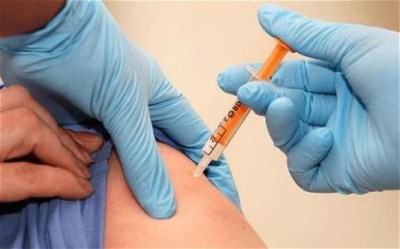
Results
What conclusion can be drawn from all this? "Sovigripp" (vaccine) receives dubious and ambiguous reviews. Opinions of doctors and patients were divided. And here everyone has the right to decide who to believe more. In principle, if you do not suffer from viral diseases, and are not afraid of new drugs, then our today's version is quite suitable for an injection.
"Sovigripp" (vaccine), the instruction, reviews, recommendations and contraindications of which were brought to our attention, is domestic product first of all. You don't need to be afraid of him. Yes, it is not worth experimenting when you are suffering from side effects. And children also do not need to inject such injections until this drug is considered a "new word" in medicine. Otherwise, there are no visible reasons for concern.
Influvac ® (Influvac ®)
Influenza vaccine, subunit, inactivated.
Registration certificate:
in Russia: P No. 015694/01
in Kazakhstan: RK-BP-5-No. 000287
Dosage form:
Suspension for intramuscular and subcutaneous administration.
Influvac® is a trivalent inactivated influenza vaccine consisting of surface antigens (hemagglutinin (HA), neuraminidase (NA)) of influenza A and B viruses grown in chicken embryos. The antigenic composition of the influenza vaccine is updated annually according to the recommendations of the World Health Organization.
One dose of the vaccine (0.5 ml) contains HA and HA of the following viral strains:
* after the name of the strain, the name of the type recommended by WHO for the current influenza season is given.
Excipients: potassium chloride, potassium dihydrogen phosphate, sodium phosphate dihydrate, sodium chloride, calcium chloride dihydrate, magnesium chloride hexahydrate, water for injection.
DescriptionTransparent colorless liquid.
Immunological propertiesThe vaccine forms the development of specific immunity to influenza viruses types A and B, which occurs, as a rule, 14 days after vaccination and lasts up to 1 year.
PurposePrevention of influenza in adults and children from 6 months.
- persons over 65 years of age, regardless of their state of health.
- patients with respiratory diseases;
- patients with cardiovascular diseases of any etiology;
- patients with chronic renal failure;
- patients with diabetes;
- patients with immunodeficiency diseases (HIV infection, malignant blood diseases, etc.) and patients receiving immunosuppressants, cytostatics, radiation therapy or high doses of corticosteroids;
- children and adolescents (6 months to 18 years of age) who have been receiving drugs containing acetylsalicylic acid for a long time and, therefore, are at an increased risk of developing Reye's syndrome due to influenza infection.
- pregnant women in the 2nd and 3rd trimesters of pregnancy. Pregnant women in high-risk categories should be vaccinated regardless of the stage of pregnancy.
Hypersensitivity to chicken protein or any other component of the vaccine, severe temperature or allergic reactions after a previous vaccination with subunit influenza vaccines. Vaccination is delayed until the end of acute manifestations of the disease and exacerbation of chronic diseases. For mild SARS, acute intestinal diseases, etc., vaccination is carried out immediately after the temperature returns to normal.
Method of application and dosage- Dose for adults and adolescents (from 14 years old): 0.5 ml. The vaccine is administered once.
- Dose for children from 6 months of age to 3 years: 0.25 ml; dose for children from 3 to 14 years: 0.5 ml. The vaccine is administered once. For children who have not previously had influenza and have not previously been vaccinated, it is recommended to administer the vaccine twice with an interval of 4 weeks.
- Patients with immunodeficiency are recommended to administer the vaccine twice with an interval of 4 weeks.
Mode of application. Immunization is carried out annually in the autumn. The vaccine is administered intramuscularly or deep subcutaneously. It is strictly forbidden to administer the drug intravenously.
Interaction with other medicinal products and other forms of interactionInfluvac® can be used simultaneously with other vaccines. In this case, vaccines should be administered to different parts of the body with different syringes. Possible increased side effects. If the patient is receiving immunosuppressive therapy, the immune response may be reduced.
After vaccination, it is possible to obtain false-positive results of serological tests, with enzyme-linked immunosorbent assay (ELISA), which are due to the production of IgM after vaccination.
Use during pregnancy and lactationExperience shows that Influvac® does not have a teratogenic or toxic effect on the fetus. The Influvac® vaccine can be used during lactation.
Side effectsFrom the blood and lymphatic system: Rare: thrombocytopenia
From the immune system: In rare cases, allergic reactions are possible, in very rare cases - anaphylactic shock.
From the side of the nervous system: Often: headache. Rare: paresthesia, convulsions, encephalomyelitis, neuritis, Guillain-Barré syndrome. However, there is no convincing evidence that these reactions are related to vaccination.
From the side vascular system: Very rare: vasculitis with transient disorder kidney function
General disorders: Often: fatigue, neuralgia, not requiring treatment and disappearing after 1-2 days. Local reactions: redness, swelling, soreness, induration, ecchymosis. Systemic reactions: fever, malaise, trembling, sweating, soreness in muscles and joints.
In the room where vaccination is carried out, it is necessary to have medicines for the treatment of anaphylactic shock (adrenaline, glucocorticoids, etc.)
special instructionsThe drug may contain an undetectable residual amount of gentamicin, therefore, when vaccinating persons with hypersensitivity aminoglycosides should be used with caution.
Influence on the ability to drive a car or to control machines and mechanismsInfluvac® does not affect the ability to drive a car or use machines and mechanisms.
IncompatibilityCases of incompatibility are not known.
Package0.5 ml in a disposable syringe with a capacity of 1.0 ml with a needle closed with a plastic cap. 1 or 10 syringes in a cardboard holder or in a sealed plastic holder. The cardboard holder is placed in a cardboard box with the control of the first opening. Sealed plastic holder - in a cardboard box. Instructions for use are put into a cardboard pack.
Best before date12 months. In this case, the expiration date is considered to be June 30 of the year following the year of issue. Do not use after the expiry date stated on the package.
Storage conditionsIn accordance with SP 3.3.2.1248-03. Store in a place protected from light at a temperature of 2°C to 8°C, do not freeze. Keep out of the reach of children.
Holiday conditionsThe condition, containing 1 syringe, is dispensed from pharmacies by prescription.
A condition containing 10 syringes is dispensed by medical and preventive institutions.
Guidelines for Handling Disposable SyringesThe vaccine must be brought to room temperature before administration. Shake the syringe just before injection. Remove the protective cap from the needle and remove air from the syringe by holding it in a vertical position with the needle up and slowly pressing the plunger. With the introduction of a dose of 0.25 ml, the movement of the syringe piston is stopped at the moment when its inner surface reaches the lower edge of the needle retainer.
Last update of the description by the manufacturer 08.08.2007
Filterable List
ATX
Pharmacological group
3D images
Composition and form of release
| Suspension for intramuscular and subcutaneous administration | 1 dose (0.5 ml) |
| One dose of the vaccine (0.5 ml) contains hemagglutinin (HA) and neuraminidase (NA) of the following viral strains: | |
| A (H 3 N 2) | 15 mcg GA |
| A (H 1 N 1) | 15 mcg GA |
| B | 15 mcg GA |
| Excipients: potassium chloride; potassium dihydrogen phosphate; sodium phosphate dihydrate; sodium chloride; calcium chloride dihydrate; magnesium chloride hexahydrate; water for injections |
in disposable syringes complete with injection needles of 0.5 ml; in a pack of cardboard 1 or 10 sets.
Description of the dosage form
Transparent colorless liquid.
Characteristic
Influenza vaccine, subunit, inactivated. Influvac ® is a trivalent inactivated influenza vaccine consisting of surface antigens (HA, HA) of influenza A and B viruses grown in chicken embryos. The antigenic composition of the influenza vaccine is updated annually in accordance with WHO recommendations.
pharmachologic effect
pharmachologic effect- formative development of specific immunity.Pharmacodynamics
Forms specific immunity to influenza viruses types A and B, which occurs, as a rule, 14 days after vaccination and lasts up to 1 year.
Indications for Influvac ® (inactivated subunit influenza vaccine)
Prevention of influenza in adults and children from 6 months.
persons over 65 years of age, regardless of their state of health;
patients with respiratory diseases;
patients with cardiovascular diseases of any etiology;
patients with chronic renal failure;
patients with diabetes;
patients with immunodeficiency diseases (HIV infection, malignant blood diseases, etc.) and patients receiving immunosuppressants, cytostatics, radiation therapy or high doses of corticosteroids;
children and adolescents (6 months to 18 years of age) who have been receiving drugs containing acetylsalicylic acid for a long time and, therefore, are at an increased risk of developing Reye's syndrome due to influenza infection;
pregnant women (II-III trimester). Pregnant women in high-risk categories should be vaccinated regardless of the stage of pregnancy.
Contraindications
hypersensitivity to chicken protein or to any other component of the vaccine;
severe temperature or allergic reactions after a previous vaccination with subunit influenza vaccines.
Vaccination is delayed until the end of acute manifestations of the disease and exacerbation of chronic diseases. For non-severe SARS, acute intestinal and other diseases, vaccination is carried out immediately after the temperature returns to normal.
Use during pregnancy and lactation
Application experience shows that Influvac ® does not have a teratogenic or toxic effect on the fetus. Vaccine Influvac ® can be used during lactation.
Side effects
From the circulatory and lymphatic system: rarely - thrombocytopenia.
From the immune system: rarely - allergic reactions are possible; very rarely - anaphylactic shock.
From the nervous system: often - headache; rarely - paresthesia, convulsions, encephalomyelitis, neuritis, Guillain-Barré syndrome.
However, there is no convincing evidence that these reactions are related to vaccination.
From the vascular system: very rarely - vasculitis with transient renal dysfunction.
General disorders: often - fatigue and neuralgia, which do not require treatment and pass in 1-2 days.
Local reactions: redness, swelling, soreness, induration, ecchymosis.
System reactions: fever, malaise, trembling, sweating, soreness in muscles and joints.
In the room where vaccination is carried out, it is necessary to have drugs for the treatment of anaphylactic shock (adrenaline, glucocorticoids, etc.).
Interaction
Influvac ® can be used simultaneously with other vaccines (vaccines should be administered to different parts of the body with different syringes). Possible increased side effects.
If the patient is receiving immunosuppressive therapy, the immune response may be reduced.
After vaccination, it is possible to receive false positive results serological tests (during enzyme immunoassay (ELISA), which are due to the production of IgM after vaccination.
Incompatibility: cases of incompatibility are unknown.
Dosage and administration
V/m or PC(deep). It is strictly forbidden to administer the drug intravenously. Immunization is carried out annually in the autumn. Adults and adolescents (from 14 years old) - 0.5 ml once, children: from 6 months to 3 years - 0.25 ml, from 3 to 14 years - 0.5 ml once; children who have not previously had influenza and have not been vaccinated, as well as patients with immunodeficiency - twice with an interval of 4 weeks.
Precautionary measures
The drug may contain an undetectable residual amount of gentamicin, so caution should be exercised when vaccinating persons with hypersensitivity to aminoglycosides.
special instructions
The vaccine retains its properties for 12 months. The expiration date is June 30 of the year following the year of issue. Do not use after the expiry date stated on the package.
Guidelines for Handling Disposable Syringes
The vaccine must be brought to room temperature before administration. Immediately before injection, shake the syringe, remove the protective cap from the needle and remove air from the syringe by holding it in a vertical position with the needle up and slowly pressing the plunger. With the introduction of a dose of 0.25 ml, the movement of the syringe piston is stopped at the moment when its inner surface reaches the lower edge of the needle retainer.
Manufacturer
Solvay Pharmaceuticals B.V., The Netherlands.
Storage conditions of the drug Influvac ® (influenza vaccine subunit inactivated)
In a place protected from light, at a temperature of 2-8 ° C (do not freeze).Keep out of the reach of children.
Shelf life of Influvac ® (inactivated subunit influenza vaccine)
12 monthsDo not use after the expiry date stated on the packaging.
The main danger posed by a disease such as influenza is the occurrence severe consequences. There are many different medications available to treat the flu that help speed up the healing process. In addition to drugs that can treat the flu, there are also drugs that help prevent the onset of the disease. These are special anti-influenza vaccines that are produced not only abroad, but also in Russia. Every year the influenza virus mutates, so the use of a vaccine with the same composition is irrational. For vaccination of the population against influenza, the drug "Influvac" is used. What is included in this vaccine, and whether it is allowed to be used for children, we will find out further.
Features of the vaccination "Influvac"
The Influvac vaccine is a drug that basically contains inactive influenza viruses that are artificially introduced into the human body. Initially, influenza viruses are cultured in chicken embryos, after which they are selected and neutralized with formaldehyde. Through special technology influenza antigens are selected, after which the Influvac vaccine is created. The viruses contained in the vaccine are not capable of provoking an illness, but are intended to ensure that the human body develops appropriate immunity.
The influenza vaccine Influvac is produced in the Netherlands by the pharmaceutical company Abbott Biologicals BV. Since 1988 this species vaccines began to be used in Russian Federation. The main components of the Influvac vaccine are antigens in the purified form of the influenza A and B virus. The composition of the vaccine changes every year, otherwise the effectiveness of the drug would be zero. Depending on which influenza virus is expected, the appropriate strains are included in the vaccine.
It is important to know! When the injection is released, the package indicates the season for which the drug is intended (for example, 2016-2017).
Vaccination is recommended every year, and for this, vaccines appropriate for the season should be used. The vaccine contains particles of viruses such as H3N2, H1N1 and B. In addition, the vaccine includes additional components:
- formaldehydes;
- polysorbate;
- sodium citrate;
- chicken protein;
- sodium and potassium chlorides.
It is important to know! If a person has signs of intolerance to these components, then vaccination with just such a drug should be excluded.
The Influvac vaccine is well tolerated not only by adults, but also by children. Influvac instruction provides for the use of the drug for children from the age of six months. The following categories of people should be vaccinated against influenza:
- People who have frequent illnesses ORZ.
- Patients whose age exceeds the mark of 60-65 years.
- Patients with the disease diabetes as well as those with immunodeficiency.
- In the presence of diseases of the heart and vascular system.
- During pregnancy from the second trimester.
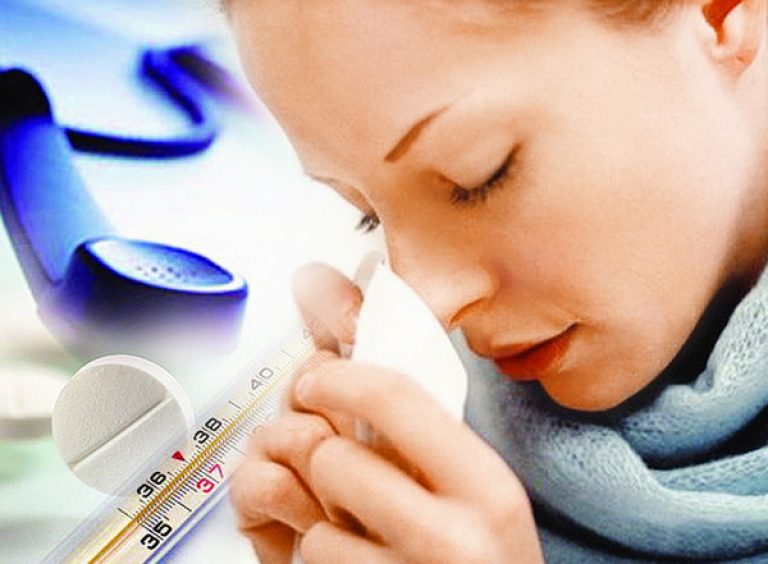
It is important to know! Not only the above persons can be vaccinated, but also all citizens, starting from 6 months. Vaccination is not mandatory, so it is optional.
The action of the injection "Influvac"
When the Influvac influenza vaccine is administered, the maximum immunity protection is not formed immediately, but after 2 weeks. When surface antigens enter the body, an immune response occurs. In the case when influenza viruses enter the body that has been vaccinated, the antibodies destroy the shell, and also provoke the death of the viral shells.
It is important to know! Studies on the effectiveness of Influvac injection have shown that the drug is effective in 90% of cases.
Based on the studies, it was concluded that Influvac has not only increased immunogenicity, but also a high degree protection from illness. It was also concluded that the injection has a positive effect not only on influenza, but also on the signs of acute respiratory infections. Vaccination is best done in early autumn before the onset of cold weather, and its effectiveness lasts about a year. Doctors recommend repeating the vaccination annually before the start of autumn or with the advent of spring, when the immune system after winter, also weakened.
Features of the injection
The drug for the prevention of influenza and influenza diseases is available in disposable syringes, and one dose in a syringe is designed exclusively for one patient. It is not necessary to collect or dissolve anything for vaccination, since the drug is already ready for use. One dose of the drug contains 0.5 ml of the drug. For adults, children and adolescents from 3 years old, the drug is used in the amount of one dose. Children from 6 months to 3 years of age are given half the dosage in the syringe. If a child is vaccinated for the first time, then vaccination is carried out twice: the first time in the amount of 0.25 or 0.5 ml, and the second time a month later in the appropriate dose.
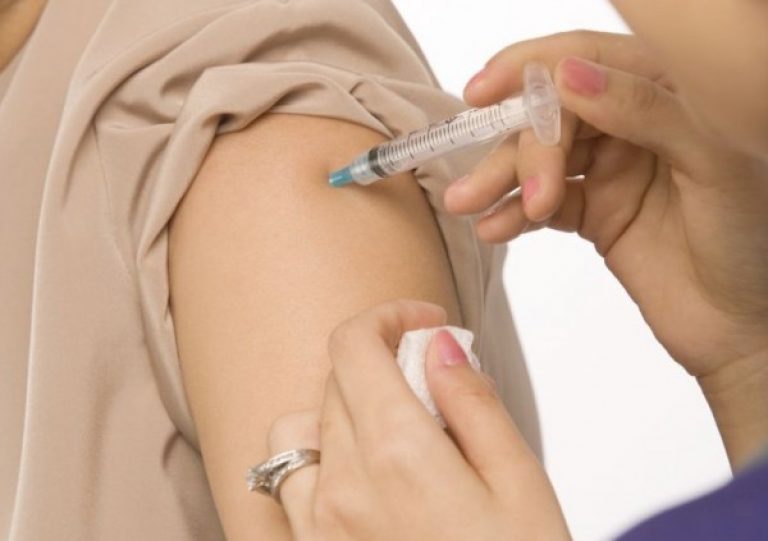
It is better to inject into the muscle, but it can also be under the skin, with the exception of a vein. Health care workers inject the drug into the shoulder or hip area. It is not recommended to inject the medication into the buttock, as a large number of adipose tissue will lead to slow absorption of the drug.
It is important to know! Before injecting into the body, medical worker must make sure that the drug has not expired.
Before using the injection, it is recommended to warm it to room temperature, which will speed up the process of assimilation by the body. After vaccination, it is not recommended to wet the injection site, it is especially contraindicated to get dirty substances at the injection site.
In what situations is Influvac contraindicated for use?
The instructions for use of Influvac list a number of contraindications, in the presence of which it is strictly forbidden to vaccinate. These contraindications include:
- the presence of signs of individual intolerance;
- in the presence of acute respiratory diseases: SARS and other ailments that contribute to an increase in body temperature;
- children under the age of 6 months.
Such a number of contraindications is minimal, which indicates the safety of the drug. If the patient has signs of the development of the disease, it is recommended to wait for the normalization of body temperature, and then resort to vaccination. It is not recommended to vaccinate a patient with several injections in one day. This can cause complications, as well as lead to the development of side symptoms.
It is important to know! If it became necessary to use several vaccines on the same day, then it is desirable to administer them in different limbs.
Adverse symptoms when using Influvac injection
Despite the safety of Influvac injection, side symptoms may develop, manifested in the following form:
- the occurrence of headaches;
- redness, swelling, swelling and soreness of the injection area;
- chills and fever;
- weakness and fatigue;
- vasculitis;
- swollen lymph nodes;
- muscle pain.
Based on statistics, it was found that if adverse symptoms do occur, they are expressed in the form of local reactions. To quickly eliminate swelling and soreness at the injection site, it is recommended to make an iodine mesh. The incidence of such complications is 4%. In the amount of 1% headaches and chills occur. Severe reactions of the body to the use of the vaccine were not found, but if any occur, you must immediately inform the doctor. Usually, side symptoms disappear the next day, and in exceptional cases - on the second day.
One of the most dangerous reactions to a vaccine is an allergy, which manifests itself in the form of anaphylactic shock. When allergic reactions, and especially the development of anaphylactic shock, requires immediate hospitalization patient requiring adrenaline or epinephrine.
It is not recommended to vaccinate a patient who is in a state of alcohol intoxication. Despite the fact that the reaction of the vaccine to alcohol has not been studied, the development of serious complications is not excluded.
Vaccination of children and women during pregnancy
For children, an anti-flu injection such as Influvac is approved for use from the age of six months. It is important to note that the injection should be administered before the onset of influenza, as this prophylactic drug, the main purpose of which is to exclude the occurrence of influenza. Such a vaccine cannot cure the flu, so if a person is sick, then it is necessary to be treated, and after recovery, you can get vaccinated.
It is important to know! There are cases when the patient was vaccinated, and after a while he got the flu. This means that the influenza virus entered the body even before immunity had developed (this requires 14 days after the injection), or the person did not get the flu, but ARVI or acute respiratory infections. For clarification, you need to contact your doctor. If the doctor confirms the diagnosis of influenza, then it is necessary to find out which vaccine against the disease was introduced.
Most often, reactions to the vaccine are observed in children than in adults. It is possible that the symptoms of injection in children will be presented in the form of cough and runny nose. These symptoms may take from a few days to 2 weeks.
The instruction for the Influvac vaccine provides for the use of the drug for pregnant women, but starting from the second trimester. The cleansing of the injection is so great that the drug does not negative impact to the fruit. Especially important is the use of injections for women during pregnancy, who are at risk for influenza. It is allowed to vaccinate not only pregnant women, but also nursing mothers.
Are there analogues of Influvak
A significant drawback that Influvac injection has is the high cost of the drug. Unlike the Sovigripp injection, which is purchased by the state and is free for vaccinating the population, the state does not allocate funds for the Influvac vaccine, so anyone who purchases the drug can get vaccinated.
The following drugs are analogues of Influvac injection:
- Vaxigripp, which is a split vaccine produced in France.
- Grippol produced in Russia.
- Agrippal made in Italy.
- Fluarix, which is a split vaccine containing not only antigens, but also virus molecules. Produced in Belgium.
- Begrivak. German analogue of the vaccine Influvac.
Which flu shot to give preference depends on the person who wants it. All vaccines are approximately the same, but may differ only in price.
In conclusion, it is worth noting that vaccination is recommended for all segments of the population in order to avoid the occurrence of exacerbation of outbreaks of the virus. Influvac injection is not only one of the most effective, but also safe, due to the possibility of use for children from 6 months. After vaccination, patients receive a strengthening of immunity to strains of the influenza virus, but maximum protection occurs only after 14 days.
The effectiveness of the vaccine is 90%, due to the quality of the drug. After vaccination, adverse symptoms may occur, which is normal body for such a drug. Usually, side symptoms disappear on the 2nd day, but if complications occur, you need to go back to the hospital.
